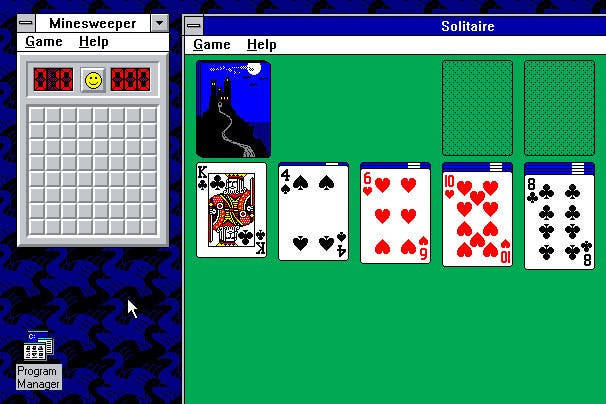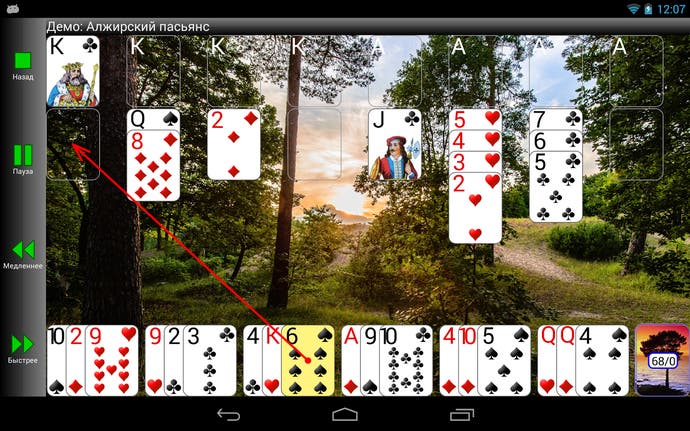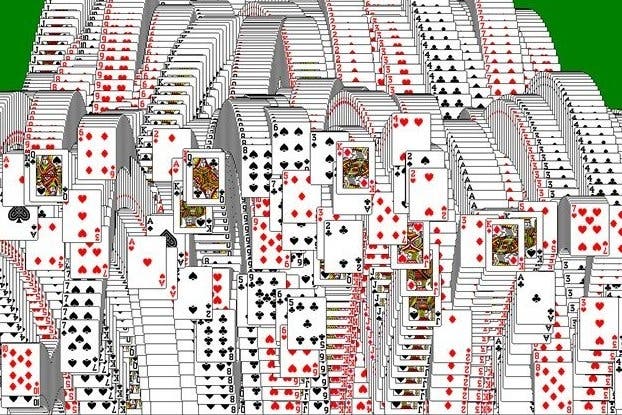Solitaire retrospective
The original roguelike?
One of the first PC games I got addicted to was Solitaire on Windows 3.0. My actual first was Ultima 5, but my love affair with that open-world RPG hasn't lasted as long as my enduring bond with Klondike Solitaire. I'd boot Windows just to play it, and sit for hours in search of a win and those marvellous cascading piles of triumph. Since then, it's been a constant companion - Solitaire is the first game I install on any new phone, and the only game that stays on it until I get an upgrade. Other games have come and gone, but I've been playing Solitaire more or less constantly for 20 years. It's a game more intimately integrated into my life than any other.
Digital Solitaire has an uncanny grip. As a physical card game, Solitaire takes just a touch too long to lay out the cards for another run. In its digital form, it's instant. When hammering restart in Trials or Hotline Miami, I'm always reminded of Solitaire, of knowing when to give up and start afresh. Through a modern lens, Solitaire is actually a roguelike. Or are roguelikes actually Solitaire?

Each run is unique, one of over 7,000 trillion possible games. Your path is clear, but your choices have uncertain consequences. Disaster can strike at any moment, with all progress lost. Foolish choices are punished, but the skill is in working out which choices are the wise ones. Crucially, the peril is seemingly random. All can be going swimmingly, and then suddenly all you need is a red six. You'd give anything for a red six. There's a black five blocking a pile, and a black seven just sitting there, waiting. All the pieces are in place for a glorious victory, save for that one single card.
Even worse, for draw-three rules, that six might be flashing past as you cycle the deck, taunting you with its inaccessibility like the locked boxes in Chrono Trigger. It's deadlock and you're trapped, but there may be a way out of this prison of utter existential despair. Pull this card to here, or that card up there. Then those on top of that. The red six has wriggled free. You must press onward - the end is in sight! You're hammering the game now, we're stacking up the foundation decks and then, suddenly. Black nine. You need a black nine. Of spades. WHERE IS THE BLACK NINE OF SPADES? Pro-tip: it's under an eight of diamonds that you can't move.
To counter this brutality, which is every bit as savage as any shock insta-death, Solitaire's progression is always obvious. Sometimes it's spectacular - who can fail to be delighted when all four aces spring up before you've drawn the first three cards from the deck? Or when the deck sequence serendipitously fires you crucial card after crucial card, just when you need it? And then there's the win. The build up, where it's increasingly obvious that you're going to win. The delicious, grand tidying-up to victory. Order has prevailed, the human has beaten the machine's fiendish shuffling and the four Kings sit atop their besuited kingdoms, ready to kick off some glorious celebratory animation. I personally love an automated card-collect, as they start running themselves as you near completion, going faster and faster as your work gets easier and easier. It's like a being on a bike and the gentle cresting of a long hill, where you were pumping the pedals just to make progress at the bottom, but now you're sitting in the saddle and coasting towards the long cruise down.

If roguelikes are about surrendering to randomised fate and facing the unknowable chaos head-on and surviving, then Solitaire is precisely the same. The game's mathematics show that in draw-3 Klondike, around 80% of games dealt can be completed. Real players nearly always score well below this. My win average is a pitiful, around 15 per cent. The reason is human error, or rather having to take a sequence of gambles and making a choice that turns out to be bad. The beauty of Solitaire is that it's rarely possible to foresee what consequences a simple card move can have. When playing, I'm either gunning for a quick win (current record: 1min 34s) or a fraught battle of attrition with the deck. While a smooth run to completion is pleasing enough, a tortuous technical scrap is more rewarding. Manipulating cards around the tableaus and the foundation piles, thinking five or six moves ahead, but still banking on that hidden tableau card being the key to victory. You know it must be, as you've been keeping tabs on the rest of the deck. When you win through, you're experiencing Solitaire at its best. It's about working your brain and drawing on experience and wisdom with a dash of risk, rather than the Solitaire gods dealing you a lucky run of good fortune.
My Solitaire of choice is Alexei Anoshenko's 250+ Solitaire Collection for Android. It's got 253 Solitaire variants and it's free (although ad-supported, but in a totally non-intrusive way). There have been attempts at expanding Solitaire into a wider game, but like Chess, it really doesn't need it, especially when there's so many variants to conquer.
I'm currently playing Staircase, a Klondike with 104 cards (two full decks), more lenient placement rules but one giant tower of hidden tableau cards. It's horrendously deep in terms of card manipulation, allowing just two runs through the deal cards, but a lot of room to jiggle. For a seasoned draw-3 Klondike head, it's like chewing on the juiciest, tastiest mouthful Solitaire can provide.
For those seeking a more tangible sense of reward, there are the old-school Vegas rules from the Windows 3.0 version that grant dollar scores for good play (as beloved by Eurogamer's own Oli Welsh, who confides that he's accrued a fabulous $3136 since January), but for me it's about the stats. Not so much the record completion times or my win percentage, but the consecutive run. I've managed two wins in a row plenty of times, even way back on Windows 3.0, but I've never won three. After the three there's four. Then five and six. I've got no doubt that in 40 year's time, I'll still be chasing the next one. Such is the nature of a game that's truly timeless.

